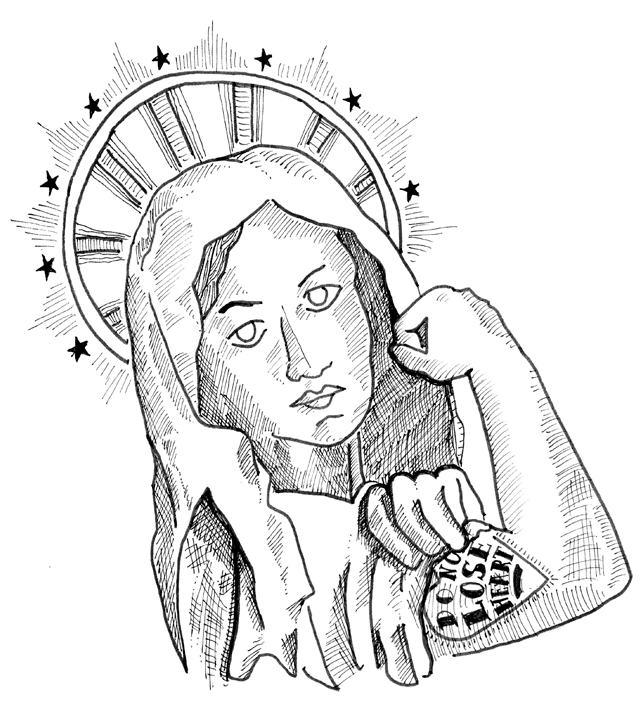 October 19, 2025
October 19, 2025
Nineteenth Sunday after Pentecost
"A Time to Act"
“Rosie the Rivetter” is a popular image from World War 2 era United States, representing the working-class women who rolled up their sleeves to toil in factories and shipyards while the men were off fighting in Europe and the Pacific. She’s typically portrayed in this pose with a curled fist, and the slogan “We can do it.” I found this image of the Virgin Mary in the same pose, when I was looking for graphics for this week’s Biblical story, and it really tickled my fancy.
The real-life “Rosies” were working-class; poorly paid; essential to the economy and the war-effort, but never really given the respect they were due. Millions of them filled heavy-labour jobs that the soldiers had done prior to the war; and millions of them were displaced from the workforce again once the soldiers came home. Somehow the fierceness and determination of those female workers never translated into respect, or decent pay! It feels like the graphic artist here wants us to imagine the strength and the struggles of peasant women like Mary in the same light.
The story we’re reading from Luke this week is about another “Rosie” – a widow who needs something from a judge who isn’t interested in paying attention to anyone who can’t stroke his ego or further his career. Of course not all judges were like that … then or now! … but for the poorest of the poor in Roman-occupied Israel, it must have been pretty normal for the common people to believe that justice was impossible for people like them. Why would a Roman judge pay attention to a poor widow? Especially if her adversary was richer, or male, or even Roman? Why would he care? What’s the incentive, for a Roman judge, to find for the cause of a poor peasant widow?
Lots of folk in our society feel shut out of the court system in Canada too, of course. It’s too expensive to hire a lawyer; it’s too adversarial to find a just compromise; the deck seems to be stacked against people with little education, or people who find English difficult. Legal reasoning is beyond even lots of educated people, and all too often it feels like cases are won by the best talker, rather than by the most righteous cause! Of course that’s a caricature, but the poorest of the poor even here don’t often feel like they stand a chance!
Surely the folks who first heard Jesus’ story about a widow who wins justice in spite of all those odds must have been just as suspicious of their legal systems as many people today are of ours! And not many of them had the gumption or determination of Rosie the Rivetter, any more than we do!
Jesus’ parable about the widow who wins her case in spite of all that is a fascinating snapshot of what God’s Kingdom might be like: a way of living where even the poorest of the poor get what they need; where no one falls between the cracks; where gumption matters and persistence is valuable even when common sense would make you give up in despair. How could we build a society where no one needs to be exceptional, in order to get what they need? How could we build a society where everyone gets the help they need to untangle disputes and find fair resolution to life’s problems – even when they’re poor, or widowed, or ESL?
Jesus’ parables often spark conversation about what’s wrong in our normal ways of living together, and what “right” would look like instead. Join us on Sunday for lively conversation about this one, and ponder how Rosie can get a fair shake.

 forest hill
forest hill